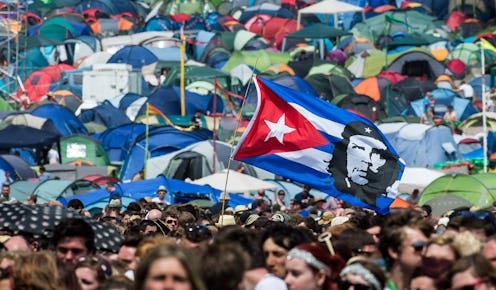News
U.S.-Cuba Relations: Before & After Obama
On Tuesday, American citizen Alan Gross marked his fourth year of imprisonment in Cuba. Gross was working as a covert contractor for the U.S. Agency for International Development, improving Internet communications in Cuban neighborhoods— against the country's wishes. Raul Castro's government concluded that Gross' work constituted "acts against the independence or territorial integrity of the state," and sentenced him to 15 years in prison. Since 2009, Gross has reportedly been confined to a jail cell for 23 hours a day, where supporters claim he has lost over 100 pounds.
On Tuesday, Gross publicly released a letter to President Obama imploring him for help. Here is an excerpt:
I ask that you also take action to secure my release, for my sake and for the sake of my family. But that is not all. There are countless Americans all over the world, some serving in uniform, others serving in diplomatic or civilian capacities, still others private citizens studying or traveling abroad, and they must not harbor any doubt that if they are taken captive in a foreign land, our government will move heaven and earth to secure their freedom.
This personal appeal comes just one week after 66 senators wrote a letter asking President Obama to ensure Gross' release. While Obama hasn't released a public statement about Gross' case yet, he has spoken out about political prisoners in Cuba more generally. And while the Bay of Pigs invasion and Cuban Missile Crisis are the worst peaks in U.S.-Cuban relations, Cuba and the United States are anything but best buds in today's political climate.
That said, since Obama's election in 2008, some things have changed. Here's your crash course in U.S.-Cuban relations pre- and post-Obama.
1. Political Prisoners
Pre-Obama: In 2002, President George W. Bush called for Cuba to release all political prisoners. In 2007, he said the same thing, calling for the release of political prisoners and for free, transparent elections. In his speech, he presented four relatives of Cuban prisoners being held for political crimes.
Post-Obama: In 2010, Obama called for the "immediate, unconditional release of all political prisoners in Cuba." That year, Cuba released 52 political prisoners. The year 2011 brought even better tidings — 3,000 prisoners were released in what seemed like a gesture of good will from the Cuban government.
2. Travel
Pre-Obama: President Bush tightened travel restrictions to Cuba, preventing ships from departing to Cuba not only to prevent commerce but also because, according to him, the Cuban military could use "deadly force" against American citizens. Bush stated that the embargo was also a "moral statement." The former president also prevented Cuban-Americans from sending any money to their families back home.
Post-Obama: In 2009, Obama granted American residents with family in Cuba permission to visit the country more easily, and to send "unlimited funds" to their family members. Two years later, Obama announced that he would allow more Americans to travel to Cuba if travel qualifies as "purposeful" (for example, religious travel or educational exchanges) so long as they have a "licensed tour operator" and government permission. U.S. citizens can of course still travel to Cuba via a third country, such as Mexico or Canada, though they could still technically be fined by the U.S. Treasury Department for doing so. Official flights to and from Cuba can also now land at U.S. international airports, and Cubans now have more freedom to visit the United States.
3. Embargo
Pre-Obama: In 2004, Bush tightened the embargo on Cuba, despite the fact that the UN had condemned the embargo in 2001 by a vote of 167-3 and a proposed congressional bill to lift it in 2003. Bush's new embargo prohibited any "unauthorized departure" of ships to Cuba in order to prevent money and commerce from reaching the country. Near the end of his presidency in 2008, Bush lifted the mobile phone ban on Cuba.
Post-Obama: The embargo is still in place, but a presidential order by Obama has eased many restrictions, including limits on the amount Americans can financially invest in Cuba. Now, U.S. citizens can invest up to $2,000 in the country. Most of the world is still against the embargo, with 188 countries now condemning it as a violation of human rights.
